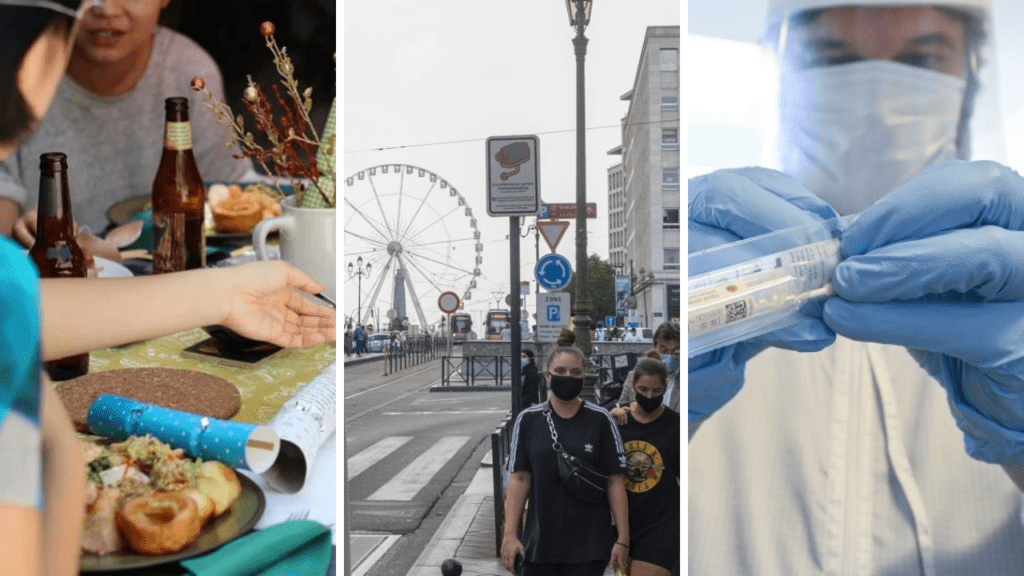Even though the average number of new coronavirus infections per day in Belgium is dropping for the third day in a row now, the decline is not happening fast enough, according to health officials.
If the figures continue to fall by about 15%, as they are doing now, there will be an average of around 350 new infections per day at the beginning of September, when the schools reopen.
“That remains a high number of infections. If the decline accelerates, for example by 50%, we will have 100 infections per day at the beginning of September. That would be more favourable in light of the reopening of schools,” interfederal Covid-19 spokesperson Steven Van Gucht said.
Last week, a very clear choice was made to give priority to the reopening of schools and to open up education as much as possible, and tomorrow Belgium's National Security Council will meet again to discuss, among other things, how that will be made possible.
In the meantime, experts have pre-emptively stressed that it is much too early to relax the rules on social contact, the coronavirus figures are finally seeing a cautious decline, and only half of travellers returning to Belgium from a red zone are getting tested.
With that in mind, here are some of the top stories from around the country to get you up to speed.
Belgium in Brief is a free daily roundup of the top stories to get you through your lunch break conversations. To receive it straight to your inbox every day, sign up below:
1. Only half of Belgians returning from red travel zones get tested
Despite the obligation to get tested for a possible coronavirus infection when returning to Belgium from a “red zone” abroad, only half of holidaymakers do it, according to official figures.
Making non-essential journeys to areas that are coloured red on the website of Belgium’s Foreign Affairs Department is not allowed, and travellers returning from one of them are required to quarantine and get tested upon arrival in Belgium.
However, figures presented in the Parliamentary Health Committee by Federal Minister Philippe De Backer on Tuesday show that only one in two returning travellers follows the rules. Read more.
2. ‘Cautious decline’ in coronavirus infections in Brussels, Crisis Centre says
The coronavirus situation in the Brussels-Capital Region seems to be “evolving favourably,” as the increase is starting to flatten, health officials said during a press conference on Wednesday.
As Belgium reported an average of 528 new coronavirus cases per day on Wednesday, this is the third day in a row that the figures are decreasing. “This confirms a favourable trend, at a national level at least,” said virologist and interfederal Covid-19 spokesperson Steven Van Gucht.
In the Brussels-Capital Region, the number of infections continues to rise by 118 new cases per day. “However, there are signs that the increase here is starting to flatten,” said Van Gucht. “It is possible that we are at the beginning of a cautious decline.” Read More.
3. Belgian average of new coronavirus cases decreases for third day in a row
An average of 528 people per day tested positive for the new coronavirus (Covid-19) in Belgium during the past week, according to the latest figures by Sciensano on Wednesday.
The trend of new infections per day has decreased by 15% over the 7-day period from 9 to 15 August.
The total number of confirmed cases in Belgium, since the beginning of the pandemic, is 78,897. The total reflects all people in Belgium who have been infected, and includes confirmed active cases as well as patients who have since recovered, or died from the consequences of the virus. Read More.
4. ‘Much too early’ to increase contact bubbles, Belgian experts stress
It is much too early to relax the bubble of 5 at Belgium’s next National Security Council on Thursday, virologist Marc Van Ranst stressed on Twitter on Tuesday.
As Belgium’s figures for new coronavirus infections have started to decrease again, the call to allow more social contact has been growing louder, among others, by shopkeepers who say the sector will “slowly bleed to death” without relaxations.
“The epidemic curve in our country is going down a little bit, and immediately comes the demand for an increase in the ‘bubbles.’ It is too early! I will say it again: it is too early!” Van Ranst wrote. Read more.
5. Thousands support Brussels family fighting to remain in their ‘Tiny House’
More than 3,000 people have come out in support of a Belgian family fighting to be allowed to continue living in their self-built, 16-square-metre home in Brussels.
After spending around €30,000 and years building it, Maxime Bonaert and Sabine Daibes propped up their so-called Tiny House in a residential street in the leafy municipality of Woluwe-Saint-Lambert.
But the owners of the tiny wooden home, who recently welcomed a baby, have now been told they must tear down the house and leave by September, after municipal authorities told them that living in such a small space clashed with current housing regulations in Brussels. Read more.
6. Belgium bought one million ‘unreliable’ Covid-19 test kits
Earlier this year, the federal government in Belgium bought one million serological test kits for Covid-19 – tests which turn out to be unreliable, according to a study carried out in Denmark.
The tests were ordered by the Federal Agency for Medicines and Health Products (FAMHP), with director-general Hugues Malonne claiming “a sensitivity and specificity of 100%” – a claim even the manufacturers themselves did not make.
The agency ordered one million test kits from the Italian manufacturer DiaSorin, at a cost of €7 million, which were then delivered unsolicited to laboratories. Now, a comparative study by Danish researchers has revealed that the DiaSorin test is unreliable. Read more.
7. Countries led by women responded better to Covid-19, study confirms
Women leaders systematically perform better in fighting Covid-19 than their male counterparts, a study published by Elsevier’s SSRN confirms.
Since the start of the pandemic, many have remarked that countries led by women (like Germany, Taiwan and New Zealand) seemed to be battling the virus more effectively than some of the world’s biggest countries led by men (such as the United States, the United Kingdom and Brazil).
The Guardian reported on Tuesday that this assumption may be true based on an initial study by Professor Uma Kambhampati and Dr. Supriya Garikipati. Read more.
Maïthé Chini
The Brussels Times



